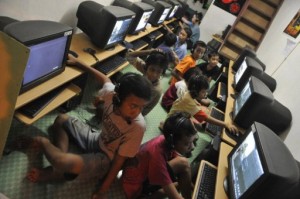There’s an angel watching over your child on the Internet.
“Project Angel Net,” a 24/7 operation center and website aimed at fighting online sex predators and cyber bullies, was launched on Thursday by the Criminal Investigation and Detection Group (CIDG) of the Philippine National Police (PNP).
The CIDG head, Director Samuel D. Pagdilao Jr., said Angel Net sought to protect children from cyber criminals involved in online pornography, gambling, and identity theft, as well as ordinary netizens who bully or take advantage of others.
The launch of the website www.cidgangelnet.ph coincided with the opening of the CIDG’s anticyber crime operation center, Pagdilao said.
The website, officials said, will serve as a complaint center where people can directly report incidents of child abuses related to the Internet.
As of Thursday, however, the “contact us” section did not yet have a mechanism where people could just type in their complaints. It only had the addresses and phone numbers of the operation center.
Tips to parents
The website will also feature warnings about the dangers of Internet addiction among underage kids, as well as tips for parents about keeping their children safe online.
At the launch, Pagdilao noted that even his 8-year-old son was addicted to computer games. “When I return home from work, I notice he’s still glued to the computer screen,” he said.
“As a parent, first, I have to orient him on the old way of disciplining children, which is imposing time and limits,” Pagdilao said in an interview.
“Second, we have to encourage him to engage in other activities; take him to some other place; and third, you have to point out those sites that he should visit safely,” he told reporters.
20 million users
The Philippines is ranked 17th among the nations with the highest number of Internet users, according to the CIDG’s Anti-Transnational Crime Division chief, Senior Supt. Gilbert Sosa.
Records compiled by the CIDG showed that Internet users in the Philippines went up to 20 million in 2010 out of a population of 99 million, representing a 29.7-percent penetration share and a startling 1,385-percent increase from 2000.
“Accordingly, more than 50 percent of Internet users are minors aged 17 years old and below,” the CIDG said.
“Apparently, every house that has a computer is a potential victim of Internet crime. At present, abuses through social networking media are increasing at an alarming scale,” Sosa said.
Tracking predators
Felino Castro V, the director of the Management Information Service of the Department of Social Work and Development, said the 1,000-fold increase in Filipino Internet users from the last decade had amplified the need to protect children.
“We have received complaints of children being sold online… There are children being bullied… and eventually, if we look at our laws, we just have to coordinate among our law enforcers and they will be able to curb this trend,” he said.
The operation center at Camp Crame is equipped with computers and manned by trained technical operatives. It is seen to enhance the capability of the CIDG to monitor and track cyber predators. A walk-in complaint desk will be run by the Women’s and Children Protection Division.
Pagdilao noted that in spite of several incidents of crimes committed through the Internet, “these crimes have been hardly reported and acted upon” because there was no specific PNP unit to accommodate reports on cybercrimes.
Digital tracking
“Adding to that is the fact that law enforcers have limited resources and ability to confront Internet-related crimes,” he said.
“Confronting crimes of this nature cannot be dealt with traditional anticriminality operations, especially with the kind of situation law enforcers find themselves in,” Pagdilao said.
“It is for this reason that the CIDG is exploring other avenues beyond common investigative and detective work to properly address the problem that is bounded by the intricacies of Internet,” he added.
According to the CIDG chief, Angel Net will involve “24/7 digital tracking, collating, collecting, archiving, investigating and interdicting activities that will identify Internet predators.”
The result would be “the proper documentation of their corresponding illegal activities leading to their subsequent arrest,” Pagdilao said.
Angel Net will coordinate and cooperate with other stakeholders, such as the media, Internet service providers, schools, nongovernmental organizations, rehabilitation centers, youth groups, social welfare offices, and telephone companies, as well as the Interpol and the United Nation Children’s Fund.
Site of choice
In June, the CIDG noted an apparent upward trend in general computer crimes in the first half of the year, particularly identity theft, libel, estafa (fraud), harassment and hacking.
Walk-in complaints to the agency about computer crimes from Jan. 1 to June 14 numbered 56, just 26 cases short of the total for the entire 2010.
Of the complaints, Facebook was the social networking site of choice of most of the perpetrators, with six cases each of estafa and libel, three each of harassment and hacking, and five identity theft cases for the first six months.
Two complaints for pornography were also registered in that period.
There were also complaints involving personal e-mail (five complaints), the microblogging site Twitter and Multiply (one each), and the online auction site eBay.
Eleven complaints for threat involving cellular phone use were also recorded during the same period, up from the four cases recorded the whole of last year.
On the other hand, only two credit card fraud cases were recorded in the first six months, compared to six in 2010.
But the figures covered only the walk-in cases directly reported to the CIDG. The agency will have to coordinate with other units and the local police to collect other data.
